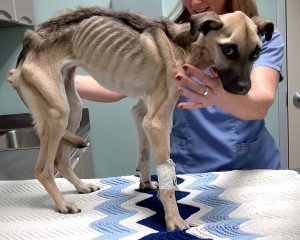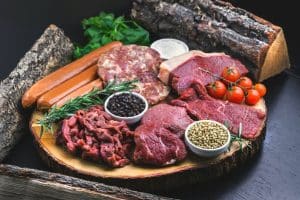If you’re searching for how long can a dog go without food, then it must either mean your dog is refusing to eat due to an illness or perhaps another reason. I sure do hope you’re not starving the poor pup for no reason.
For good reasons, I researched a dog’s digestive system that I’ll share with you. Then, we’ll look at why dogs may go without food for an unusual length of time before comprehensively answering the question.
The length of time a canine can go without eating food depends from one canine to another and is affected by the following factors:
- Dog’s age
- Dog’s general physical and mental health
- Time of the dog’s last meal
- Whether or not the dog is currently sick or on medication
- How hydrated the dog is
Therefore it’s fair to say there is no set time for how long any single dog could go without food.
Generally, a healthy adult dog can survive for 3-5 days without eating. In comparison, puppies, senior dogs and sick dogs have different dietary needs. They cannot survive without food for 3-5 days. It can create a host of problems.
| Age/Health | Maximum Days Without Food |
|---|---|
| Puppies | 2-3 days |
| Senior Dogs | 2-3 days |
| Healthy Adult Dogs | 3-5 days |
| Sick Dogs | 1-2 days |
Do remember that these numbers are rough estimates that may vary depending on individual factors such as breed, size, and overall health. More importantly, even if a dog can technically survive without food for a certain number of days, it’s still recommended to provide them with regular, balanced meals to support their overall health and well-being.
Never, ever let your dog go without food for too long. If your dog has suddenly lost their appetite, then you need to seek medical help at once – your dog is likely to be suffering from some sort of illness that needs to be treated. In some cases, elderly dogs can refuse to eat as they prepare for the end – however, this is not the article for that subject today!
With the right treatment, your dog’s appetite should return.
How much should a dog eat in a day?
Every dog has a different metabolism which affects the daily calorie consumption. Although, dogs should generally be fed 1-3 balanced meals a day. On some rare days, your doggo might not eat many meals but treats along the way.
| Category | Amount of dog food per day (in grams) |
|---|---|
| Puppies | Puppies need to eat more often and in smaller portions, approximately 3-4 meals a day. They need food per their age and breed: 2-3 months old (400-500g), 3-6 months old (350-400g) and 6-12 months old (300-350g). |
| Senior Dogs | Senior dogs require less food due to slower metabolism. Generally, 7 years and older dogs need 200-250g of adult dog food per day. |
| Adult Dogs | An average adult dog needs around: small breeds (< 10kg) – 200-250g, medium breeds (10-25kg) – 350-450g, and large breeds (> 25kg) – 450-600g. |
| Healthy Dogs | A healthy dog requires around 2-3% of their ideal body weight. |
| Sick Dogs | The amount of food a sick dog needs will depend on the underlying health issue, so it is best to consult with a vet. |
Do remember that the above guidelines are rough estimates and may not be suitable for every dog. It’s best to consult with a veterinarian to determine the best feeding plan for your dog based on its individual needs.
What can cause dogs not to eat their food?
There are a few reasons which can cause a dog to go without food, here we’ll list them and give you some tips on how to help
Sickness
Sickness can affect a dog’s appetite and metabolism. A lack of appetite and refusing food is usually a symptom of a wider problem. If your dog has been refusing food for 24 hours then it’s time to take them to the vet. Ensure they are well hydrated during this time as going without water can cause more problems than going without food.
See if they are showing signs of being in pain, check to make sure they have been wormed and always make sure they are resting properly.
Read More: What is the best worm treatment for dogs? How to do deworming at home?
Dental problems
Many dogs who turn their nose at grub may have an underlying dental problem, making it difficult or painful to eat. If your dog hasn’t eaten in a while take a look at its mouth for signs of a dental problem.
New surroundings
Some dogs experiencing new surroundings, perhaps because of travel may sometimes be put off their food. If this is the case, your dog should start eating again once they’ve settled in. In the event, it doesn’t and it’s now been more than 24 hours then a trip to the vet may be needed.
Bringing creature comforts like their favourite toys and preferred bed helps a lot with travel problems.
Behaviour problems
Behaviour problems causing dogs to not eat food is a tricky to figure out, here are some behaviour problem causes:
- Is the dog bowl dirty?
- Are you trying new food that they just don’t like?
- Is there an aggressive dog in the area?
- Is the height of the bowl too high?
- Are they dehydrated?
- Are they full because they’ve been fed too many treats?
There are a lot of things that could be causing problems so it’s always good to investigate them all before panicking, why not install a dog camera and watch them? As with many of the other points above, give it 24 hours before getting medical help.
What happens to a dog if they don’t eat?
A dog not eating and who is starving is a terrible and depressing sight to behold. Being hungry is no fun so being starving is a miserable existence. Starvation has a few phases which can change the appearance and behaviour of a dog over time which gets worse and worse.
Phase 1
Within 24 hours of starvation, a dog will be mostly fine. However, the glycogen stores will start to be used up instead of using up the nutrients in food. Blood sugar is one of the most important things for a dog to keep normal. For the first 24 hours, there should be enough in the dog’s stores to keep them going at a relatively normal level.

Phase 2
As the glycogen stores become depleted the dog’s body begins to create energy from other sources, this is called gluconeogenesis. The dog is now quickly becoming unstable and unhealthy with very little energy to do anything but survive. This is a critical time to get your dog to the vet or fed as death quickly looms at this point.
Phase 3
Your dog is now breaking down the fat for energy full time and the effects of starvation will be clearly visible. The liver is also releasing ketones into the bloodstream as a form of energy. There is nowhere else for the dog to get energy from and unless they are given the medical attention they will eventually perish.
The key takeaway here is that how long can a dog go without food is around 3-5 days but not eating should be a cause for concern after 24 hours. There may be a lot of reasons why you’re dog isn’t eating so you should consider them all before seeing medical help – it may be a simple reason which can be resolved quickly and easily.
Read More: Best Dog Food For Flatulence in UK 2023
Which nutrients are important for dogs in the UK?
Nutrition plays a crucial role in the overall health and well-being of dogs, regardless of their age, size, or health status. Here, I will discuss the essential nutrients that dogs need, broken down by life stage and health status.
1. Adult Dogs: Healthy adults need a balanced diet with adequate protein, fat, and carbohydrates to maintain their overall health and well-being. Vitamins and minerals, such as vitamins A and E, are also essential to support the health of their skin, coat, and immune system.
2. Puppies: Growing pups have different nutritional needs than adult dogs. Their diet should be high in protein and fat. Calcium and phosphorus are the next most important nutrients to supplement strong bones and teeth. Additionally, they need a balanced amount of vitamins and minerals for overall health.
3. Senior Dogs: Due to their slower metabolism, senior dogs typically need fewer calories. Their diet still needs adequate protein and a balanced amount of vitamins and minerals. Since senior dogs are prone to joint issues, their diet should also contain glucosamine and chondroitin as advised by your vet.
4. Sick Dogs: When a dog is sick, their nutritional needs change drastically. For example, dogs with liver or kidney disease need a special diet that’s low in protein and phosphorus. And, dogs with digestive issues will need a low-fat diet for easy digestion. Consult with a veterinarian to determine the best diet for your sick dog.





There’s a reason 3 my friend as to why someone would ask the question “how long can a dog survive without food?” Consider this reason: a discarded stray wandering the highway that’s looking for something to eat but a bit to untrustworthy of people to be rescued. There are millions of them, spread the word for S.O.S. (Save Outcast Strays).
Good point
13 month dog boisterous barks at least noise been feeding 3 times a day ok took to a trainer and told what to do ok but he said he was a bit over weight told to feed him once a day at night is this right this was yesterday so far he has had no food till tonight that will be 30 hours please he is a German Shepard mix